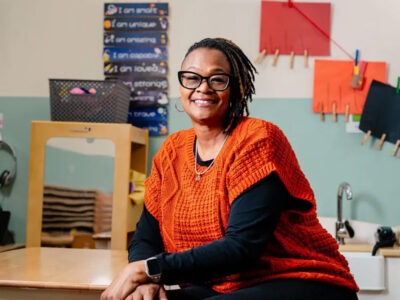If we want a high-quality workforce tomorrow, we have to invest in education today.
Give that by 2050, 40% of Michigan’s workforce will be made up of people of color, we need to invest now in quality education so all of our children, especially children of color, have equitable access to opportunities that prepare them to be successful in the future economy.
Closing the educational achievement gap for children in Michigan can be one of the most beneficial strategies for producing future economic gains. For every $1 spent on quality early care and education for children under age 5, there’s a $13 return on investment because when children get high quality early care, they enter school ready to learn and the economy ready to work.
Michigan is working to expand preschool to an additional 22,000 4-year-olds. While critically important, it’s not enough.
Research shows that 80% of a child’s brain is developed by the time they reach age 3.
Every child needs access to quality care and education starting at birth and throughout their childhoods to ensure they enter kindergarten ready to learn, and that they’re reading at grade level by third grade. This is critical to setting children up with the academic, social and emotional readiness necessary for success in school, work and life.
This means that greater support is needed for education initiatives for young children in centers and daycares, and also that parents need more resources to use in their homes, since they are their children’s first teachers.
Today, there’s an opportunity to create innovative ways to tap federal dollars coming into the state to transform our early care systems and lead to better educational outcomes for our children and families. It is especially important to support informal care providers who have stepped up to serve their communities during the pandemic.
W.K. Kellogg Foundation grantees are connecting the resources in communities to improve education for our state’s youngest learners. Hope Starts Here, First Steps Kent, BC Pulse and Early Childhood Investment Corporation are all increasing affordable access to quality early care.
"Closing the educational achievement gap for children in Michigan can be one of the most beneficial strategies for producing future economic gains."
Hope Starts Here is a connector of early childhood efforts in Detroit. They are mobilizing a citywide commitment to support our youngest children and families, through a common vision, coordinated implementation, collective advocacy and a shared infrastructure. Launched after a community engagement effort with more than 18,000 Detroiters in 2016, today Hope Starts Here works to achieve six imperatives to make Detroit a city where young children come first by 2027 by ensuring they have equitable access to affordable and quality services, resources and education.
A collaborative group of organizations in Battle Creek, Mich., is using shared data to better serve young children in the city. Led by BC Pulse, this collaborative established a system that tracks over time how children in the city are doing, putting in place supports based on research to improve outcomes. Thus far, this collaborative has managed to improve the kindergarten readiness rate in the city from 15.5% in 2014 to more than 50% today.
First Steps Kent, in Grand Rapids, is developing and coordinating a shared services initiative among early childhood providers in Kent County. In an effort to improve services for children and families, they promote innovative, research-based early childhood practices and policies across the continuum of programs and settings. Their goal is to ensure the Grand Rapids community has the policies, programs and supports in place so that children are healthy, thriving and developmentally on track when they start kindergarten.
Many families choose to keep their children in informal care with family members or close friends who may not be trained in early care and education. Ensuring informal providers have access to the resources they need can improve outcomes for children in these early care settings. Early Childhood Investment Corporation is doing just that by coaching and mentoring informal providers, helping them set goals, doing side-by-sides with them, encouraging them to join the quality rating system and then tracking those who have joined to ensure they’re raising the level of quality of care they provide.
Childcare is essential economic infrastructure
Michigan’s economic recovery depends on the quality and strength of our workforce – now and in the future.
Participating in the workforce is difficult for many parents right now as early care and education centers and caregivers closed or downsized during the pandemic. Without access to affordable, quality care, many parents made the difficult decision to leave the workforce.
In 2020, nearly 136,000 women left our state’s workforce – resulting in a nearly 6% decline. While men initially left the workforce in comparable numbers, their rate of participation has rebounded, but the rate of women’s participation has not. And the impacts are much worse for women of color than they are for White women.
Currently, in Michigan 125,000 3- and 4-year-olds do not have access to early care and education programs. Prior to the pandemic, 44% of parents lived in a childcare desert, and finding childcare slots for infants and toddlers was far more difficult than finding care for preschoolers. For those who could access care, the cost of that care is equivalent to college tuition.





Comments